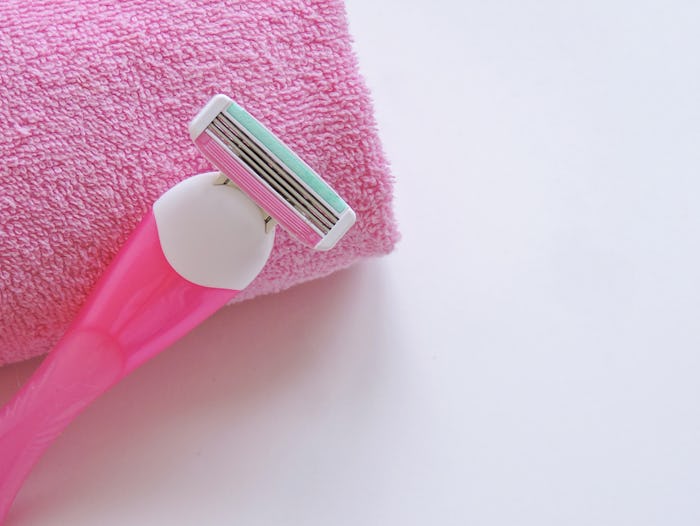Life

Here's What Women Really Need To Know About Shaving Their Face
A few years ago, there was a surge of beauty bloggers that began extolling how all women should be shaving their face. Like many, I was a tad confused. For years I was told that shaving the baby (and not-so-baby) hairs on my face was a no-no. They'd grow back thicker, there would be more of them, somehow the act of shaving would cause them to multiply and take over my entire body turning me fully into a werewolf — or something to that effect. But these bloggers were saying the opposite. What's true? Should women shave their face, or is it a beauty wonder?
Most women have a thin covering of vellus hair, otherwise known as "peach fuzz" covering their faces, noted DermaFlash. It's the thin, whispy hair that you can feel when you run your fingertips along your jaw. Some women have a bit more hair on their faces, whether it be from genetic predisposition to thicker, darker, facial hair, or because of some underlying condition affecting the hormones that spur hair growth such as polycystic ovarian syndrome (PCOS) or congenital adrenal hyperplasia, according to the Mayo Clinic. Either way, many women want to eliminate this hair, and many beauty experts advocate that shaving is a quick and simple way to do it.
The first time I heard about women shaving their face was when my esthetician suggested I try something called "dermaplaning," at the salon. Dermaplaning is basically like taking a straight razor or a scalpel to every excess hair, as well as the first layer of skin on your face. Dermatologists and med clinics, like that of Dr. Irene Gladstein in New York City, have been doing the procedure for years, and they claim that it rejuvenates the skin by providing deep exfoliation. My esthetician noted that using a small facial razor at home would be the best thing for me between visits.
Honestly, I was sold. I have battled PCOS for 15 years, and the older I get and the more children I have, the more hair I have on my face and chin. When my friends found out that I started shaving my face, more than one wondered if it's bad for women to shave their facial hair. After all, doesn't that make it grow in darker and thicker? Not according to Dr. Debbie Palmer, co-founder of the Dermatology Association of New York. She told Huffington Post, “Hair will not grow back thicker or faster. Shaving does not change the number of hair follicles in the skin or the rate of hair growth.”
That's not to say there aren't detractors to the practice. The experts collected by The Guardian noted that shaving can be an inflammatory practice, and if you're doing it because you think that it is some great new technique to exfoliate your skin, it's probably an unnecessary step. After all, if you're scrubbing your face with a hand towel when you wash, or using exfoliating creams, you're already removing a lot of dead skin. Also, if you're not careful, you can definitely hurt yourself. Just like when you shave any part of your body.
As for me, I've honestly never had a smoother face since I started shaving. I am extremely particular on my products, vetting each one that I use carefully. Many of the bloggers shave with regular water or shave gel. I do not. I am a sensitive lady, and I am an old millennial who doesn't want to age any faster, so I use Aesop Moroccan Neroli Shaving Serum, and Shiseido facial razors. After shaving, I immediately rinse with cool water, and then go in immediately with my Tatcha Pore Perfecting sunscreen and Glossier priming moisturizer. Yes, it's a lot of steps, but once you start, you never want to stop.